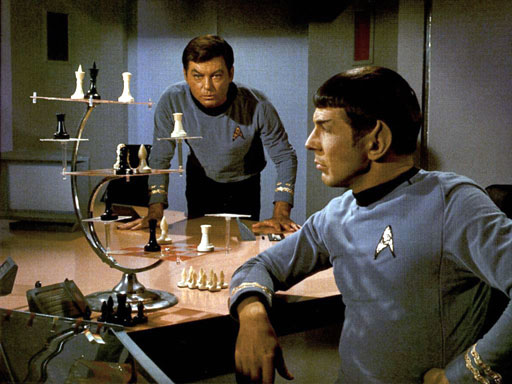Back to The Game of Chess...
In summary, chess consists of all sorts of symbols and, more appropriately to this class, the implications that we endow on its mechanisms (even if we devise creativity as a possibility of chess play, it is entirely mechanistic by itself). A chessboard, for example, is simply an 8x8 array with alternating colors. However, it can be seen in all sorts of lights:
- A geometry space for solving war-like problems
- A checkerboard form representing medieval symbols
- A common Muslim and Western heritage of games
- Paths in space or time
- A place of position and authority/power for the piece situated in it
- A scenario that one faces in life, external from the game itself
Furthermore, each piece is a faceless object that we have endowed with features and powers (via the rules of chess). These powers, and the ways in which we use power to our advantage, represent the human game that is constructed. While a computer can defeat us in the game, it could not have defined it as a purposeful game nor devised how we play it. Chess is by its very nature an intimate game of two players who are trying to figure each other out. Arguably, whether computers have ruined this intimacy is for us to decide.
Given that you are reading about chess on a computer, I'd argue that chess may have brought you to a computer. In fact, many "computer people" are drawn in to computers by games.
Chess is Logical
In conclusion, I would say that chess is a logical game (so agrees Spock!). However, as in this image, we can mold chess to fit our own artistic and symbolic interpretations. Here Spock is demonstrating how to bring dimensionality to the pieces - adding another hierarchy on top of the hierarchy already defined by the pieces. I would argue that chess is by construction logical, but by our human interaction abstract. Thus, even within the logical framework of the game we can perceive creativity (or its absence) based on the critical measures that we - as humans - devise. Chess has evolved, never shedding its older values dating back to archaia, but frequently building upon them as time passes.
Unpacking concludes the series of topics for The Game of Chess. Congratulations on making it through, and I hope you found my presentation enlightening.
- [link] copyright Paramount, of course

